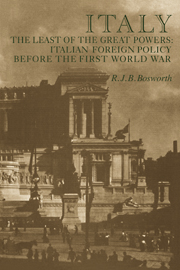Book contents
- Frontmatter
- Contents
- Dedication
- Preface
- List of maps
- 1 Society and politics in Liberal Italy
- 2 New political pressure groups and foreign policy
- 3 The making of a Foreign Minister: Antonino Di San Giuliano
- 4 The Consulta: the bureaucrats of foreign policy
- 5 How Italy went to Libya
- 6 How Italy stayed in Libya
- 7 The politics of alliance: Italy in the Triple Alliance, 1912–1914
- 8 The politics of friendship: Italy, the Triple Entente, and the search for a new Mediterranean agreement, 1911–1914
- 9 ‘Un cliente maleducato’: Italy in the Dodecanese and Ethiopia, 1912–1914
- 10 Preparing to digest some spoils: Italian policy towards Turkey, 1912–1914
- 11 San Giuliano's epilogue. The realities of European war 28 June to 16 October 1914
- Conclusion
- Appendix I The Ten Commandments for Italians abroad
- Appendix II Pro-memoria on our politico-military situation, by A. Pollio
- Appendix III San Giuliano's poem about his funeral ceremony
- Abbreviations used in the notes and bibliography
- Select bibliography
- Notes
- Index
7 - The politics of alliance: Italy in the Triple Alliance, 1912–1914
Published online by Cambridge University Press: 16 November 2009
- Frontmatter
- Contents
- Dedication
- Preface
- List of maps
- 1 Society and politics in Liberal Italy
- 2 New political pressure groups and foreign policy
- 3 The making of a Foreign Minister: Antonino Di San Giuliano
- 4 The Consulta: the bureaucrats of foreign policy
- 5 How Italy went to Libya
- 6 How Italy stayed in Libya
- 7 The politics of alliance: Italy in the Triple Alliance, 1912–1914
- 8 The politics of friendship: Italy, the Triple Entente, and the search for a new Mediterranean agreement, 1911–1914
- 9 ‘Un cliente maleducato’: Italy in the Dodecanese and Ethiopia, 1912–1914
- 10 Preparing to digest some spoils: Italian policy towards Turkey, 1912–1914
- 11 San Giuliano's epilogue. The realities of European war 28 June to 16 October 1914
- Conclusion
- Appendix I The Ten Commandments for Italians abroad
- Appendix II Pro-memoria on our politico-military situation, by A. Pollio
- Appendix III San Giuliano's poem about his funeral ceremony
- Abbreviations used in the notes and bibliography
- Select bibliography
- Notes
- Index
Summary
‘A pointless farce’ – the blunt summation by General Conrad von Hötzendorf of the value and character of Italy's membership of the Triple Alliance is corroborated by events. Italy, after only the briefest hesitation, did not join her allies in war in August 1914, and before that month was out negotiations had begun on the terms by which Italy would instead enter the war on the Triple Entente side against her old allies.
The firm base of our foreign policy is, as is well known, the Triple Alliance … I am able to affirm that no point of disagreement … [between Italy and Austria] can be seen on the horizon today, with respect to any great international questions.
In retrospect, San Giuliano's words to the Chamber of Deputies in December 1910, repeated in similar phrases at almost weekly intervals in the following three and a half years, seem almost ludicrously false, another example of Italy's habitual diplomatic deviousness and dishonesty.
Yet the issue is by no means so clear. Indeed, it is controversial enough to have encouraged a greater volume of analysis and commentary than any other aspect of Italian foreign policy just before the First World War. Interpretations have varied considerably. The major Austrian diplomatic historian, A. F. Pribram, writing in the 1920s, agreed with Conrad that the Triple Alliance was always worked in Italy's favour, and that Italy never had any intention of loyally limiting her ambitions within it.
- Type
- Chapter
- Information
- Italy the Least of the Great PowersItalian Foreign Policy Before the First World War, pp. 196 - 254Publisher: Cambridge University PressPrint publication year: 1979

